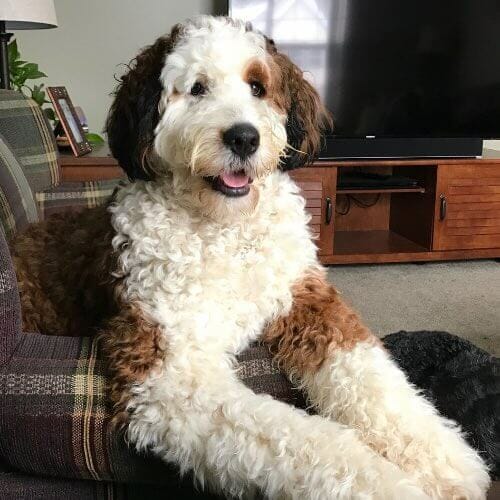
Have you ever wanted a dog that will be the ultimate cuteness from all angles? A Bernese Mountain Dog Poodle mix is going to be perfect. Here’s the proof you didn’t know you were waiting for.
A Bernedoodle is the mix of a Bernese Mountain Dog with a Poodle. It is a popular designer breed with one parent of each dog. These are large dogs that are often between 21-29 inches (53-74 cm) and weigh between 60-90 pounds (4.5-41 kg). They tend to live between 10-15 years.
Their coat type is often tri-colored, and it has an adorable wave to it that is springy to the touch, like their poodle genetics. They are loving, goofy, clingy, and attentive. They do have some health issues to know about to help you care for them properly.
What is a Bernese Mountain Dog Poodle mix called?
There are a few designer names for this mixed breed. The most common one is a Bernedoodle. Other names include a Bernese Mountain Poo, Bernese Mountain Doodle, and a Bernese Poodle. They’re all great examples of adorable names!
What are the different types of Bernese Mountain Dog Poodle mixes?
Quickly growing in popularity, a Bernedoodle mix can come in a few forms, depending on what blend you’re looking for as far as genetics go. These include:
- F1
- F1B
- F2
- F2B
F1
F1 Bernedoodle is a cross between a Bernese Mountain Dog and a Poodle. It’s considered a first-generation Bernedoodle because it’s got the breed strength that you’re looking for.
F1B
F1B Bernedoodle is cross-bred with a poodle. Of course, it is a bit more dilute in its Bernese genes than the F1.
F2
This is often referred to as a second-generation Bernedoodle. It is two F1 Bernedoodles bred together to create a litter of puppies.
F2B
These puppies come from an F1 parent breed and a poodle in a true mash-up. This is often the preferred route for those that want minimal shedding.
As you can see, it does get a little complicated. However, it also means that you’ll have a bit more control over price and breed longevity within the genes of your puppy!
Is there such a thing as a mini Bernedoodle?
Absolutely! A Bernedoodle is really popular, though it is often tough to find reputable breeders specifically for mini Bernedoodles.
In the case of this particular kind of designer pup, you’d be looking at a Bernese Mountain Dog crossed with a toy or mini poodle, depending. The smaller poodle is what would make for the smaller size of the Bernedoodle overall.
What does a Bernese Mountain Dog Poodle mix look like?
This is where the cuteness factor comes in! These are seriously adorable puppies that will be a great blend of both parents’ looks. They can be brown, black, or tri-colored. Some will have the classic Bernese markings, and some will just blend the tri color throughout.
Most of these designer breed puppies will have curly hair, like that of their poodle parent breed. They will sometimes have it interspersed with wavy fur, but in most litters, the poodle curl does win out from head to toe! This means their fur will be springy to the touch, and they won’t shed quite as much as the Bernese parent (more on that in a bit).
Your pup’s primary color depends on what genes are strongest in the dog, of course, and what kind of dog you are purchasing (F1 versus F2, which we talked about above).
It’s not uncommon to find the browns, blacks, and whites all mixed up in the puppy, often meaning some people mistaking them for some sort of sheepdog with curly fur!
How big does a Bernedoodle get?
Assuming that you are going with your classic standard poodle bred with a Bernese Mountain Dog, you’ll get a dog anywhere between 21-29 inches (53-74 cm) in height, and they’ll weigh between 60-90 pounds (4.5-41 kg).
However, they can be lower or higher than both of these metrics, based on different kinds of Bernedoodle options and, of course, the parents’ genetics with height and weight.
The lifespan of a Bernese Mountain Dog Poodle mix
Many large dogs don’t get to enjoy as many years as smaller dogs. This is simply because larger dogs are more prone to health problems.
One of the cool features of a Bernedoodle is that they take on the longer lifespans of their poodle parent breeds. This earns them between 10-15 years in most cases.
The better care you take of them, and the more interaction that you have with your vet, the more years you can enjoy with them in great health, too.
What is the personality of a Bernedoodle?
This is where a lot of the fun comes in for those expectant pet parents. A Bernedoodle is a loving, fun, and goofy dog. Even in those dogs that tend to be more serious, Bernedoodles tend to have a goofy side still, even if it’s every once in a while.
They love nothing more than to be right with their favorite humans, and they will always choose to be as close as possible — including on your lap, if you let them.
Since Bernese Mountain Dogs were bred as farm dogs, they do tend to have herding personalities. This means that they’ll circle their family as they’re out and about, and they will always be scanning the area around to make sure that their “flock” is still safe and more-to-less in their view.
They are great with kids and other pets. In particular, Bernedoodles tend to make great friends with cats and other household pets.
Since they are so easy-going in their personality, it often surprises people to learn that they are often skittish with strangers. This is simply due to a lack of socialization, though.
These dogs tend to love retrieving (aka fetch), swimming, and exploring new spaces. They are happiest if their family is exploring them too, of course.

Are Bernedoodles barkers?
You may have heard stories of a Bernedoodle being a barker. It really depends on the dog, of course, and training.
However, poodles are known for barking. Since they like to alert their humans that someone is here — even if it’s a squirrel — they’re known to be rather barky. This trait sometimes comes out in Bernedoodles, too. However, you can train them out of this!
Are Bernedoodles good family dogs?
Bernedoodles do make good family pets. They are often referred to as “gentle giants” for just this reason. They love to be with the kids and other household pets. They are loving, kind, warm, and playful. They are great playmates for other household members, making them the perfect family companions.
The only thing to note is that their size makes them a bit of a “bull in a china shop.” They will get carried away and accidentally sweep everything off the coffee table or knock a child over simply because they forget their size and are just excited to play.
Are Bernedoodles high maintenance?
They can be high-maintenance dogs. We’ll discuss this more in detail, but these mixes are known for being possessive, prone to separation anxiety, and having relatively high care needs as far as health and general day-to-day care.
If you are looking for a relatively self-sufficient dog, you’ll find that a Bernese Mountain Poo will be high-maintenance.
Is it better to get a male or female Bernedoodle?
As far as the choice between male or female, it really comes down to sorting out what you already have at home. If you have female pets, you’ll find a male will get along better, and vice versa. Whenever you bring a dog home that is the same sex as your other household pets, it can lead to territorial issues on both sides.
These can be managed with neutering or spaying, though, which is generally recommended for many other health reasons, too.
A Bernedoodle’s health issues
As with any other large breed dog, you will be dealing with some “big dog” health problems. These combine with some of the breed-specific problems for both parent breeds, too:
- Joint dysplasia
- Sebaceous adenitis
- Allergies
- Epilepsy
Joint dysplasia
Most common in elbows and hips, large dogs will have a condition as they age where the joints will not work correctly. The legs/arms will not go into their joints or move as they should, causing stiffness and pain. It often is seen as a specialized kind of arthritis.
Hip dysplasia – is a condition where the hip joint does not fit into place correctly. This causes pain and arthritis later in their life. Their gait will be off, especially if both hips are affected. It can cause them to have trouble walking or even running normally. Again it is educated preventative medicine through special diets and exercise that can help them.
Elbow dysplasia – This manifests in a similar way to hips but is more common in smaller dog breeds. It is essential to work on preventative medicine before symptoms set in.
A vet can help you work preventatively throughout their puppy years to help keep them strong and healthy. This is often a blend of controlled exercise and special diets.
Sebaceous adenitis
This is a fancy term that is used to describe fur growth problems. It could result in furless patches, weak fur, or excessive shedding. It could be just in certain spots or widespread throughout their body.
Your vet will be able to help you care for your dog at home during flare-ups.
Allergies
These dogs can also have weaker immune systems, which can make issues like allergies much more common.
When you bring your pup home, you’ll want to ask your breeder for a profile on their parents as far as allergies go. You’ll also want to seriously consider an allergy test for your dog since allergies often are hard to detect and can be serious in dogs!
Epilepsy
For unknown reasons, epilepsy is common in poodles and can be in Bernese dogs as well. A Bernedoodle should be okay, primarily if appropriately bred, but there’s often no way to know for sure, just like in humans.
If you’re concerned about it, your breeder and vet can offer information as well as tips and suggestions.
How to take care of a Bernese Mountain Dog Poodle mix
Adding a Bernese Mountain Doodle to your family is a great choice when looking for a loving family pet. However, it also has several needs when it comes to taking proper care of them. Here are some of the key focus points.
Grooming and bathing
Most Bernenoodles are considered to be low to moderate shedders. The more poodle genes they have in them, the less likely they will be dealing with shedding.
However, you will still need to brush them and help them keep their fur and skin healthy long-term.
When trying to avoid sebaceous adenitis flare-ups, you’ll find that daily or weekly brushing with a soft brush will help!
Regular baths are also a good idea to help keep the skin moisturized. You’ll want to use a sensitive dog-friendly shampoo.
Since Bernedoodles love water, you’ll often find bathing to be easy. However, their size makes it easier for you to take them to a groomer if you struggle with them.
One of the biggest things about these dog breeds is that they can be droolers depending on the Bernese genes. If this is the case, regular grooming helps keep their fur clean, comfortable, and stain-free. You’ll also want to look at facial wipes too.
Exercise needs
While they are large dogs, many Bernese Poodles don’t actually have a lot of need for exercise. They should get between 30-60 minutes a day, but that’s more just to help them stay healthy.
You can do this through walks and playtime, of course, but many of these dogs are just as happy to spend their time exploring the backyard (again). They’re curious and energetic that way, so it doubles as great mental stimulation.
Emotional and mental care
When left on their own, these mixed dog breeds can be a bit of a problem. Their natural intelligence makes them grow bored very quickly. You’ll need to have puzzle toys or similar focus activities for them to do when you go off to work for the day. This will keep your house destruction-free.
You can manage a lot of this through exercise before you leave and when you get back, of course. A tired dog is a relaxed dog, so it’ll do well on all fronts to help them use up their energy before they are alone for hours at a time.

What is the price of a Bernese Mountain Dog Poodle mix?
When sourcing this breed, you definitely need to go with an experienced and capable breeder specifically of this breed. When done incorrectly, you can be dealing with anxiety and health problems in your puppy.
The price, then, will be anywhere from $3 000 to $5 000. If you are going for a smaller or toy one instead, you’ll find these to be much more expensive.
F1 puppies are going to cost more than F2 puppies because of the purebred status of the parents.
The high price tag is a combination of being in high demand as far as puppies go and also the fact that the breeding process is challenging since they have to be bred carefully to keep them safe and healthy.
Pros and Cons of a Bernese Mountain Dog Poodle mix
If you’re curious about whether or not this adorable and fluffy dog is going to be right for your family or not, here are some straightforward pros and cons to help you in your decision.
Pro consideration points
- Easy to train
- Friendly
- Great with kids and pets
These fluffy dogs are great for families, all things considered. They are attentive, in the middle of everything, loving, loyal, friendly, and enjoy mini-humans and other household pets.
For those that want the classic family dog that is happy lounging or going for a walk with the family, it’s a great dog breed.
Cons to think about
- Clingy and possessive without socialization
- Need a decent amount of care
- Can be barkers
With that amount of love and enjoyment of being around their family, they will be possessive and clingy. They often don’t like the idea of being left on their own and will always want to be underfoot. This will be challenging if you don’t want a dog attached at the hip.
They can be barkers, so they will need to be trained out of this behavior young. Luckily, the training itself does tend to be simple because they aren’t known for being stubborn dogs.
They do require daily care as far as grooming, walking, and attention. Again, if you do not want to spend hours per day caring for a dog, a Bernedoodle might be high maintenance.
The other thing is that they do need socialization training. With their tendency to be skittish around new people, the more experiences they have in socialization at a young age, the better they will enjoy new adventures later in life.
To summarise
A Bernedoodle is a mix between a Bernese Mountain Dog and a Poodle. While miniature versions exist, most are bred with a standard poodle and will be 21-29 inches (53-74 cm) and weigh between 60-90 pounds (4.5-41 kg).
They often have curly fur, and it is often tri-colored, either with or without the Bernese markings.
They are loving, friendly, goofy, intelligent, and smart dogs. They can be prone to separation anxiety and some health issues, making proper care really important.
A Bernedoodle is going to be a loving and attentive family dog. They will require daily care and can be prone to some health concerns, making an excellent “classic” dog for the whole family.
If you know someone who’s hunting for these traits, share the cuteness with them!
